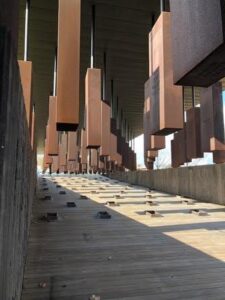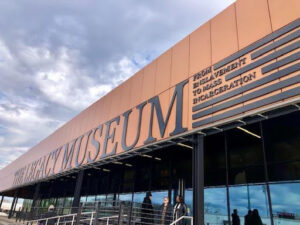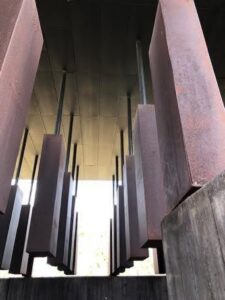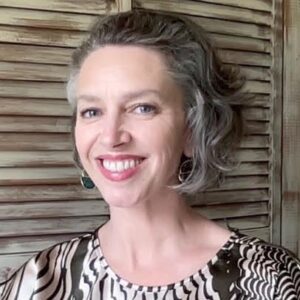Since January 2023, I have been participating in a U.S. Department of Education grant funded project to strengthen arts educational programming in the nation’s schools. The project is called Race, Equity, Arts, and Cultural History (REACH), and it is directed by a former Michiganian of the Year, Dr. Denise Davis-Cotton. The purpose of this work aligns with that of MAEIA and MI Creative Potential beautifully, as the intention of all three efforts is to build access to quality arts education, rich in social-emotional learning and culturally responsive pedagogy. We want the best for all students and believe the arts are a vehicle for compassionate living.
Before I share more about my experience, I need to express profound gratitude for the invitation to participate in this work. In my years as Executive Director of Lansing Art Gallery & Education Center, providing local students with opportunities to engage in the arts was a driving force in our work. When I was completing my Master’s in Arts Administration, my thesis was titled Arts Education: A Fundamental Right for Students in the United States of America.
One of my many champions and respected colleagues at the time was, and continues to be, Dr. Bryan Beverly. During a time when working to diversify the Board of Directors at the Gallery, Bryan, a person of color, was willing to sit with me to learn about our work in creating space for all children and to drive community arts access. He listened about the research I had conducted for my master’s thesis and understood the value from the moment I told him the title. Though he didn’t serve on the board at that time, our interactions had a profound impact on me and on my work.
When I changed professional venues and was working further afield from arts education, Dr. Beverly invited me to join the REACH think tank. That invitation became a lifeline. It reconnected me with arts education centered on access for all students. I was galvanized to be part of a cohort of like-minded people working at the intersection of arts education and equity. Not long after the first think tank, I stepped into a larger role with MAEIA as the Engagement and Fund Development Strategist.
The invitation from Dr. Beverly yielded another powerful influence in my personal development and professional capacity by introducing me to Dr. Denise Davis-Cotton. Dr. Davis-Cotton, through the REACH project, has created a paradigm shift by engaging a cohort of people in a series of meaningful experiences. These experiences connect museum studies to curricula that take the form of site-specific interactions with cultural aspects of our American history and dialogue. And she continuously reminds us, “This is not a field trip!” She, and her team, provide experiential lessons for education professionals that demonstrate how the arts transform lives and commit these professionals to take action to make this transformation happen for students.
Once such experience included a visit to the Equal Justice Initiative’s The Legacy Museum and The National Memorial for Peace and Justice. Bearing witness to the horrors of slavery was a harrowing experience. As our museum journey progressed, however, it showcased the resilience of overcoming dehumanizing conditions and offered a hopeful perspective for the future through exceptional art exhibits. It offered insight on the systemic incarceration of people of color and a call to action to become involved in policy.



Dr. Davis-Cotton has built a legacy over decades from teaching students, to establishing a school where children could learn through the arts, to joining academia, to writing a national grant to support systemic change in the arts. At this stage in my career, it is making systemic change that I admire the most.
I observed that Dr. Davis-Cotton is intentional to include national educational leaders in this work. The result is that once invited, the warmth and grace is like nothing I’ve ever experienced. It has provided me a level of belonging that I almost feel like I don’t deserve, but that is identity work that is mine to do personally and examine professionally. I recognize I am just learning how to be an ally and I am grateful for the opportunities I have been given in this setting. I am so honored to be a part of it.
This spring, REACH think tank participants will be reporting on how their work aligns with and amplifies the components of the framework for equity. I am eager to share how MAEIA and MI Creative Potential embody our shared values and has since their beginning. Here are my personal commitments to arts education and equity and how we are living these commitments collectively in Michigan:
- I will consider how youth can be the inspiration for change, and that they can also enact change. I will remember that Dr. Martin Luther King, Jr. was just 26 years old when he began his work leading the bus boycott in Montgomery, Alabama. Through the Regional Arts Education networks, we will invite students and families to tell stories that help strengthen our arts education ecosystem and foster equitable change.
- I will engage with stakeholders to examine how policy could better promote cultural change and combat systemic racism. I recognize that policy enabled slavery, violence, mass incarceration, and systemic oppression in financial and housing sectors as well as education. Policy also has the potential to make positive change and can begin to combat systemic racism in many sectors. Notably, the Michigan Assessment Consortium (MAC), the organization that leads MAEIA, is actively addressing these issues in classroom assessment practices.
- I will remember to interact with people as human beings and consider their challenges. As REACH think tank colleagues illustrated, people may be experiencing a range of challenges from hunger and violence to neglect and generational trauma. I will consider triggers, trauma, and mental health when working with stakeholders in education. The MAEIA resources related to social-emotional learning, through the lens of nervous system regulation, embeds consideration of triggers, trauma, and mental health, in supporting students and educators’ growth and well-being.
- I will support data collection and policies that foster arts education for ALL of Michigan’s students. All students deserve the benefits of music, visual arts, dance, theater, and media arts which engage learners and develop many social-emotional skills such as self-expression, empathy, collaboration, and resilience. Not all students, however, have access to the arts across the state. Through MI Creative Potential, MAEIA is leading a collective impact initiative designed to advance equitable access to quality arts education through data collection, strategic partnerships, the implementation of the MAEIA resources, and the development of a statewide arts action agenda
Here are a few ways you can champion arts education and align your intentions with mine:
- Invite students and families to share their feedback candidly and regularly.
- Read the MAC Statement-Equity and Social Justice.
- Revisit Heather Vaughan-Southard’s SEL blog post: Embodiment: The depth of SEL in and through the Arts.
- Revisit Nafeesah Symonette’s blog series on Culturally Responsive Teaching in and through the Arts.
- Look for upcoming MAEIA Academy Courses on SEL and Culturally Responsive Teaching in and through the Arts.
- Stay tuned for our public report on the Michigan K-12 Arts Education Survey coming later this year.
- Keep an eye on the newsletter for ways to get involved with MI Creative Potential as we grow!
I am hopeful that you’ll join me on this journey. Michigan is building momentum for systemic change through arts education by taking action based on our learnings because, after all, “this is not a field trip.” Together, we can take action toward equitable access to the arts for all students.
___________________________________________________________________________________________________________
 Barb Whitney is an artist, educator, and administrator. Whether teaching, leading an arts nonprofit, coordinating Michigan’s statewide partners, or conducting national research, her career’s common threads are to uplift and inspire through the arts. She serves as faculty for the Arts, Cultural Management, and Museum Studies Program at Michigan State University and as the MAEIA Engagement and Fund Development Strategist. For more about Barb: barbwhitneyart.com. To contact Barb: 517.883.1435, barb.whitney.artist@gmail.com.
Barb Whitney is an artist, educator, and administrator. Whether teaching, leading an arts nonprofit, coordinating Michigan’s statewide partners, or conducting national research, her career’s common threads are to uplift and inspire through the arts. She serves as faculty for the Arts, Cultural Management, and Museum Studies Program at Michigan State University and as the MAEIA Engagement and Fund Development Strategist. For more about Barb: barbwhitneyart.com. To contact Barb: 517.883.1435, barb.whitney.artist@gmail.com.
Photos provided by the author.
Click here for a Printer friendly version of this article.
Leave a Reply
You must be logged in to post a comment. Don't have an account? Register Here.